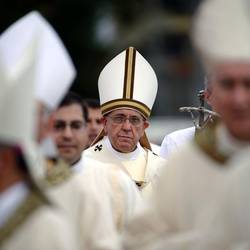Francis and Opposition in the Church
By Andrea Tornielli
The arrest of former nuncio Jozef Wesolowski in the Vatican three days ago (Wesolowski had already resigned from the clerical state after being accused of sexually abusing minors) and the replacement of Paraguayan bishop Rogelio Livieres (who was sacked for causing division in the Church after he accused other Paraguayan bishops of not nurturing doctrinal orthodoxy) gave the impression that things are speeding up ahead of the Synod on the Family in the coming weeks. The severity – as per the code of law – shown towards the former Polish archbishop sent out a strong message: that the days where impunity and cover-ups were the norm, have now come to an end. Wesolowski’s arrest is the final step on a path courageously begun by Benedict XVI, who sacked hundreds of priests and quite a number of bishops during his pontificate. “Francis is a leader and is able to take difficult decisions,” Fr. Antonio Spadaro, editor-in-chief of Jesuit periodical La Civilta Cattolica told Italian daily La Stampa. “But,” he added, “Pope Francis knows when it is important to do justice and act according to the law in cases such as that of Santo Domingo’s former nuncio.” Straight after his election, having taken on board all that was said during the general congregations held prior to the conclave, Francis immediately set to reforming the Curia. Because of the inquiries that were being carried out by the Italian magistrates, he was forced to start with the Vatican’s finances. The process was slow and cumbersome and the aim was to make it harder for certain past scenarios to be repeated. But more than the structural reforms he has planned or already begun, it is his personal testimony as pastor and the words he pronounces every day that are calling into question certain dynamics within the clergy which are disfiguring the Church. Like an illness that manifests itself in the games played by cliques that form within the Church, in careerism, in the not-always-so-transparent relations with politics, in excessive bureaucracy and structures which transform into clots of self-referential power, losing sight of the real purpose of their existence: serving the people of God. The powerful effects of the outcome of the 2013 Conclave are clear for everyone to see: Masses of people around the world fondly and carefully listen to the word and message of a Pope who has reignited people’s hopes after the years of scandals and court-like intrigues, which Benedict XVI went through. There are currents of opposition in the Church, some are more prominent or more structured than others. They use their alliances with certain media circles to try to discredit anything the Pope says or does, throwing the stone and then hiding their hands in their tunic pockets so to speak. This opposition does not accept Francis’ election and seeks to squeeze him into the comfortable framework of polarization between liberals and conservatives, an ideology-oriented framework which has helped many build prestigious ecclesiastical careers and is wrong. There have been numerous attempts to impose this way of thinking. The recent nomination of the new Archbishop of Chicago, Blase Joseph Cupich, an outsider, is a case in point. Cupich is a pastor who cares a lot about social issues, he is a man of dialogue who does not focus only on speaking out against same-sex marriages and has the capacity to speak without barking. “Francis does not have a rigid and abstract plan to implement in the Church,” Fr. Spadaro said. “The upcoming Synod illustrates this: he wants people to walk together and freely exchange different experiences and sensitivities in the appropriate place, which is the Synodal Assembly. It is wrong to interpret Francis’ words and decisions according to the old framework of division between liberals and conservatives. If there is one message he does not tire of stressing, it is that which he pronounced in his homily at St. Martha’s House the other day: all you need to do is listen to the Word of God and put it into practice. Of course doing this for real can be destabilizing…” Francis’ is not presenting us with a pre-engineered plan. His outlook is based on intimacy with the mystery of the Church, with the Gospel and with the most authentic tradition. In this outlook, there is certainly no room for bureaucrat bishops who are out of touch with the people, attached to their privileged lifestyles, obsessed with certain specific issues and incapable of being close to men and women just as they are and not as they would like them to be.
|
.
Any original material on these pages is copyright © BishopAccountability.org 2004. Reproduce freely with attribution.
